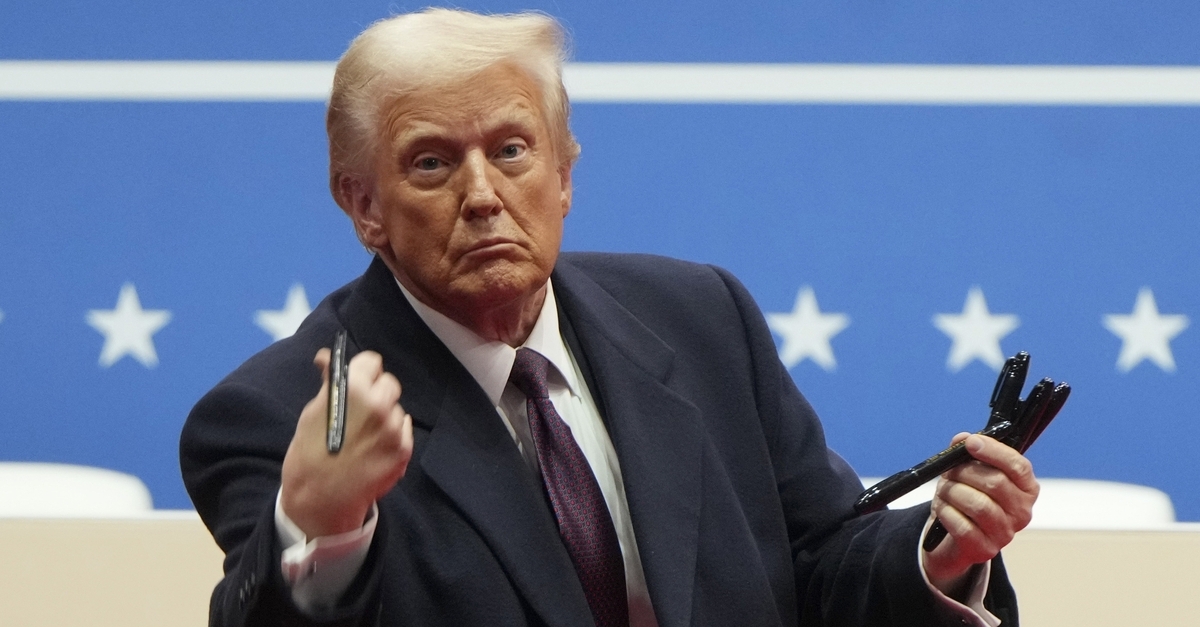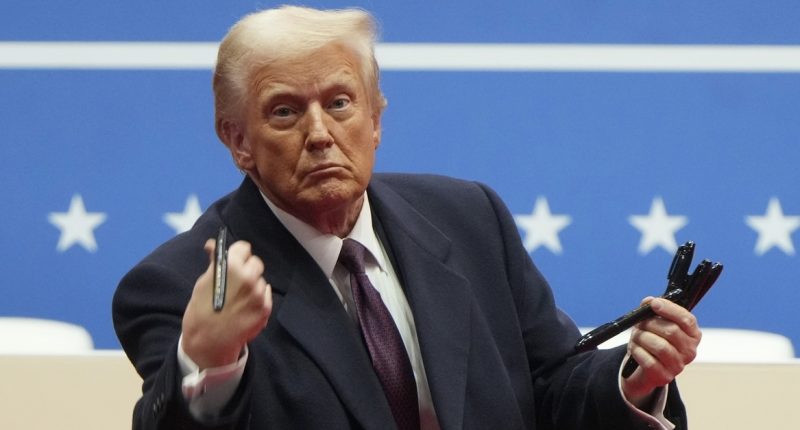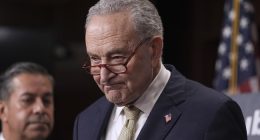
FILE — President Donald Trump throws pens used to sign executive orders to the crowd during an indoor Presidential Inauguration parade event in Washington, Monday, Jan. 20, 2025 (AP Photo/Matt Rourke, File).
The plaintiffs in one of the many lawsuits taking aim at the Trump administration’s federal spending freeze have urged a judge not to dismiss the case and, instead, to issue a temporary restraining order that would block the policy for the foreseeable future.
Earlier this week, Washington, D.C.-based U.S. District Judge Loren AliKhan issued an administrative stay against the policy, a less intrusive manner of pushing back on the administration’s plans.
In response, the Trump administration argued that the rescission of the original memo issued by the Office of Management and Budget (OMB) was more than enough to allay concerns — and that it effectively rendered all litigation moot while divesting the court of jurisdiction.
Now, the plaintiffs in the case, the National Council of Nonprofits (NCN), say the court should not give the government any credit or leeway because the confusion is both palpable and intentional.
The Office of Management and Budget issued the memo in question on Tuesday — an attempt to make good on a series of executive orders issued by President Donald Trump, which outlined spending priorities. Within hours, the federal government lurched into chaos.
In response to the specter of frozen entitlement systems, downed websites, and a general state of panic across administrative agencies, the administration quickly performed a volte-face and rescinded the OMB memo with a terse second memo that also directed employees to follow up with agency lawyers if they had any questions.
“This, the government claims, ends the case,” the latest motion reads. “But the purported rescission appears to be little more than a bait and switch. The White House press secretary immediately announced that Memo M-25-14 was ‘NOT a rescission of the federal funding freeze,’ but instead an effort to avoid the effect of this Court’s order.”
In citing the X post by White House press secretary Karoline Leavitt, the plaintiffs are tracking their argument with another federal judge’s ruling in another case targeting the spending freeze.
“This is NOT a rescission of the federal funding freeze,” Leavitt wrote. “It is simply a rescission of the OMB memo. Why? To end any confusion created by the court’s injunction. The President’s EO’s on federal funding remain in full force and effect, and will be rigorously implemented.”
The upshot of that social media post, according to the NCN and Rhode Island-based U.S. District Judge John McConnell, is direct evidence of the administration’s goal to perform an end-run around the court system’s ability to review executive actions.
Moreover, the plaintiffs say, the administration has not even paused the freeze.
“[T]he evidence shows that, although the government has restored access to some federal financial assistance, it has continued to implement the M-25-13 funding freeze, not just after the Court entered the administrative stay but even after the supposed rescission,” the motion continues. “As of yesterday, for example, the EPA was answering inquiries about continued difficulties to access funds by explaining that it ‘is working diligently to implement the Office of Management and Budget’s memorandum, Temporary Pause of Agency Grant, Loan, and Other Financial Assistance Programs’ and was ‘pausing all activities related to the obligation or disbursement of EPA Federal financial assistance at this time.””
Again, the plaintiffs track their analysis with McConnell’s early Friday ruling; the judge also noted the Environmental Protection Agency’s apparent commitment to moving ahead with the OMB memo’s dictates. The late Friday motion directly references that order.
“The only other court to review OMB’s action after the purported rescission has indicated that it agrees and entered preliminary relief shortly before Plaintiffs submitted this filing,” the motion goes on.
The plaintiffs originally requested a temporary restraining order but the judge declined — instead putting a time-limited pause on any spending freezes while the parties brief the relevant issues. The clock in the case will strike down to Feb. 3, at 5 p.m. By then, AliKhan will decide whether to lift the administrative stay on the freeze or issue a further pause in the form requested by the NCN.
The Trump administration, for their part, says there simply is no longer a legal issue before the court for the judge to consider.
“Plaintiffs’ claims in this case are directed solely against the OMB Memo, which has now been withdrawn thereby rendering their claims moot,” the government’s 33-page filing reads. “And even prior to withdrawal, Plaintiffs have not established that the OMB Memo actually caused any harm redressable by an Order in this suit. Thus, this Court lacks Article III jurisdiction over their claims.”
But the nonprofits say that’s just not true.
“Plaintiffs’ request for a temporary restraining order therefore remains very much live,” the motion goes on. “If, as appears, the government is continuing to implement the funding freeze ordered in the Memo, then the purported ‘rescission,’ is meaningless, and Plaintiffs’ request for an injunction against ‘implementing’ or ‘enforcing’ the Memo, remains not just live but compelling. Plaintiffs are not challenging a piece of paper. They are challenging the Memo’s freeze on federal funding.”
In the government’s motion to dismiss, Acting Assistant Attorney General Brett Shumate warned against the court being placed “in the role of overseeing a wide swath of the Executive Branch’s ongoing funding activities.”
The plaintiffs, for their part, say this is nonsensical handwringing — and use the opportunity to lecture about the basic nature of the court system, as well as to push for a potentially permanent court order.
Again, the latest motion, at length:
As an ancillary point, the government suggests that Plaintiffs’ challenge is inappropriate because it would require court supervision of compliance. But the government is wrong in saying that the Court cannot fashion tailored relief. Indeed, it has already done so. And an order permanently enjoining Defendants from implementing the allegedly rescinded Memo would neither be unusual nor difficult to oversee. The government should not be permitted to rely on the chaos it has created by flouting this Court’s stay, and declaring that the supposed rescission is no rescission at all, to say that relief cannot be fashioned.





